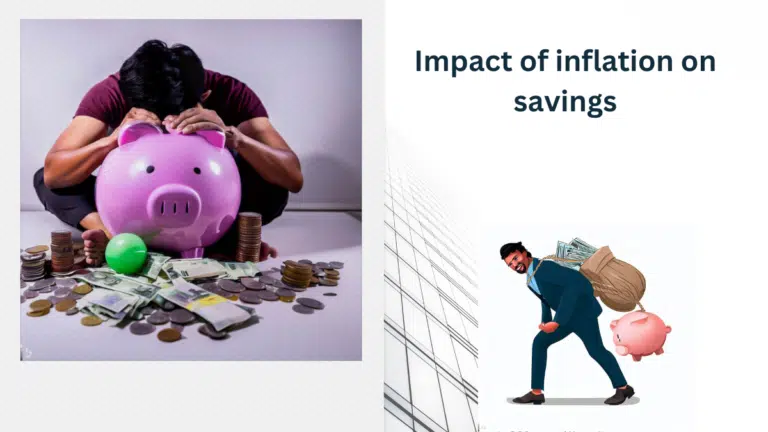Intro
Hello, everyone! Welcome to my blog where I share my insights on various topics related to finance and economics.
Today, I want to talk about a very important issue that affects all of us: inflation. Inflation is the general increase in the prices of goods and services over time.
It reduces the purchasing power of money and erodes the value of savings. In this post, I will discuss the impact of inflation on your savings, especially in relation to the Indian eco
Inflation rate in India
India is one of the fastest-growing economies in the world, with a GDP growth rate of 7.5% in 2022. However, it also faces high inflation, which has been drift around 5% to 6% in the past year.
According to the latest data from the Ministry of Statistics and Programme Implementation (MOSPI), the annual inflation rate in India slowed sharply to 4.7% in April of 2023, the lowest since October of 2021, from 5.7% in March, and slightly below forecasts of 4.8%.
This was mainly due to a fall in food prices, which account for nearly half of the consumer price index (CPI). However, inflation is still above the Reserve Bank of India’s (RBI) target range of 2% to 6%, which means that monetary policy remains tight and interest rates are high.
Impact of inflation on savings
Inflation has a negative impact on savings, as it reduces the real value of money over time.
For example, if you have Rs. 1000 in your bank account today, and the inflation rate is 5%, then after one year, your Rs. 1000 will be worth only Rs. 952 in terms of purchasing power. This means that you will be able to buy less goods and services with your money than before. In other words, your savings will lose value due to inflation.
To protect your savings from inflation, you need to invest them in assets that can generate returns higher than the inflation rate.
For example, if you invest your Rs. 1000 in a fixed deposit that pays an interest rate of 6%, then after one year, you will have Rs. 1060 in your account, which will be worth Rs. 1010 in terms of purchasing power. This means that you will be able to buy more goods and services with your money than before. In other words, your savings will gain value due to investing.
However, investing also involves risks, such as market fluctuations, liquidity issues, tax implications, etc. Therefore, you need to choose your investment options carefully, based on your risk appetite, time horizon, financial goals, etc. Some of the common investment options available in India are:
1. Savings accounts
These are low-risk and liquid options that offer interest rates ranging from 3% to 6%, depending on the bank and type of account. However, they are not very effective in beating inflation, as they offer low returns.
2. Fixed deposits
These are low-risk and less liquid options that offer interest rates ranging from 5% to 8%, depending on the bank and tenure of deposit. They are better than savings accounts in terms of returns, but they also have lower flexibility and higher tax liability.
3. Mutual funds
These are medium-risk and liquid options that offer returns based on the performance of a portfolio of securities such as stocks, bonds, etc., managed by a professional fund manager. They offer higher returns than fixed deposits, but they also have higher volatility and expense ratio.
4. Stocks
These are high-risk and liquid options that offer returns based on the performance of individual companies listed on stock exchanges. They offer the highest potential returns among all investment options, but they also have the highest risk and uncertainty
5. Gold
This is a low-risk and less liquid option that offers returns based on the demand and supply of gold in the global market. It is considered as a safe haven asset that can hedge against inflation and currency depreciation, but it also has low returns and high storage cost.
Conclusion
Inflation is a reality that we cannot ignore or avoid. It affects our savings and our standard of living.
Therefore, we need to be smart and proactive in managing our finances and investing our money wisely. We need to diversify our portfolio across different asset classes and balance our risk-reward ratio.
We need to monitor the inflation rate and adjust our expectations accordingly. We need to plan for our future goals and secure our financial well-being.
I hope you found this post informative and useful. If you have any questions or comments, please feel free to share them below. Thank you for reading!
